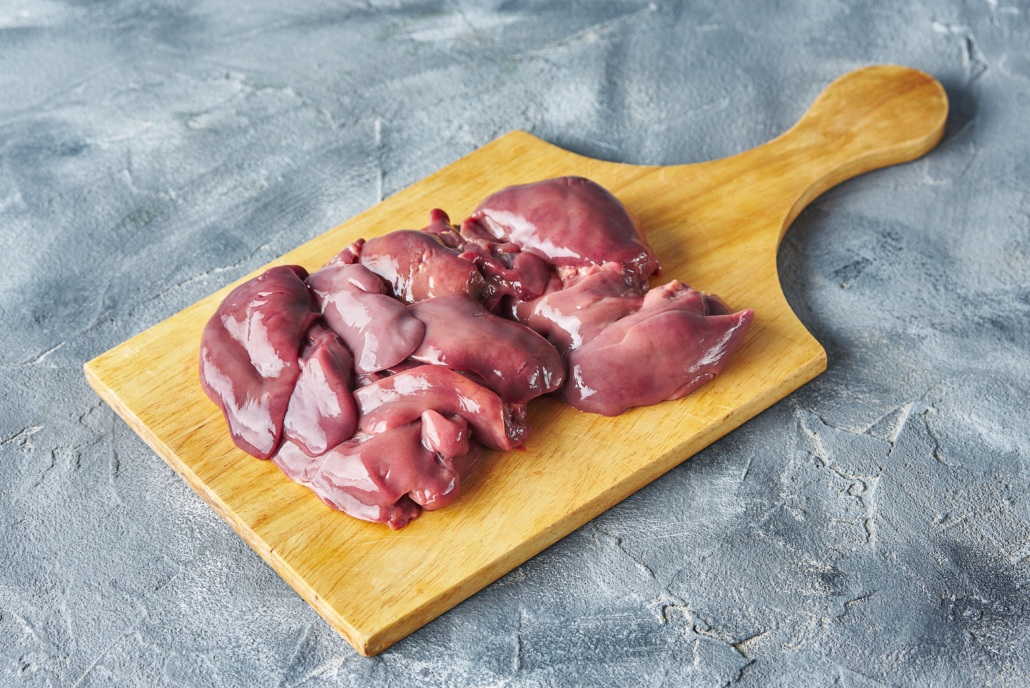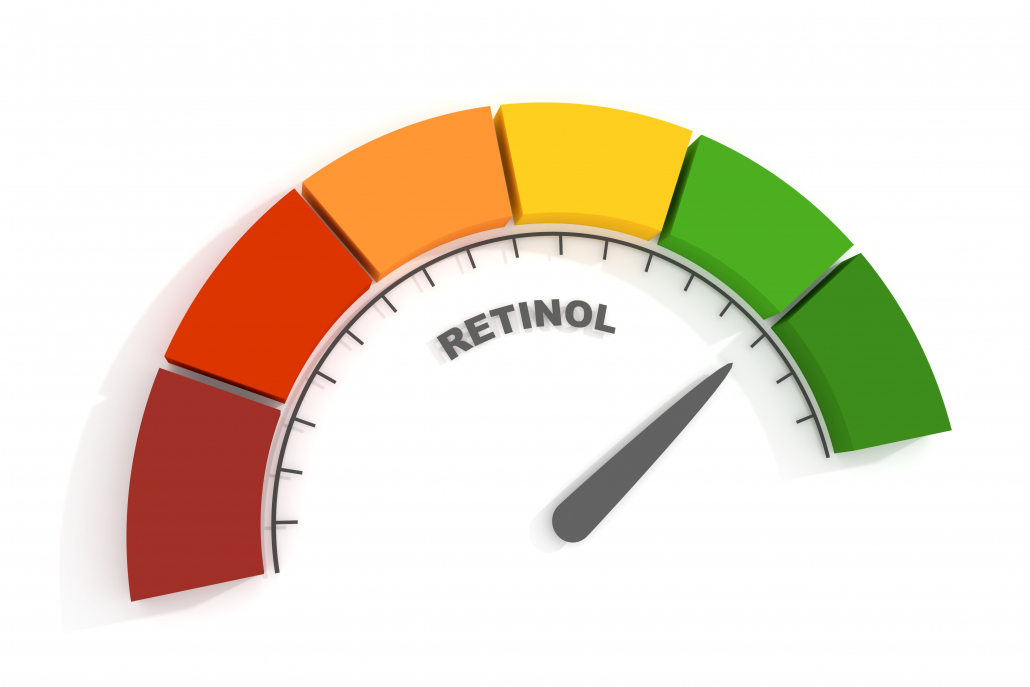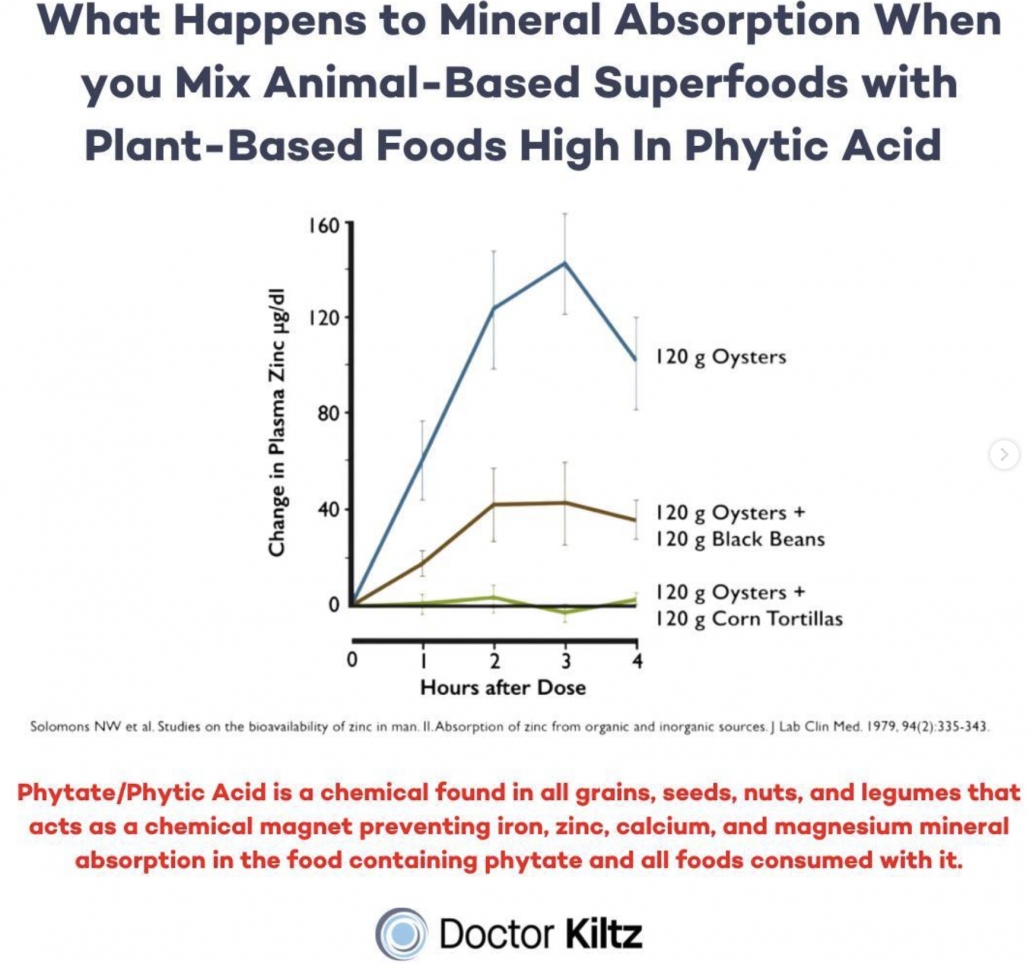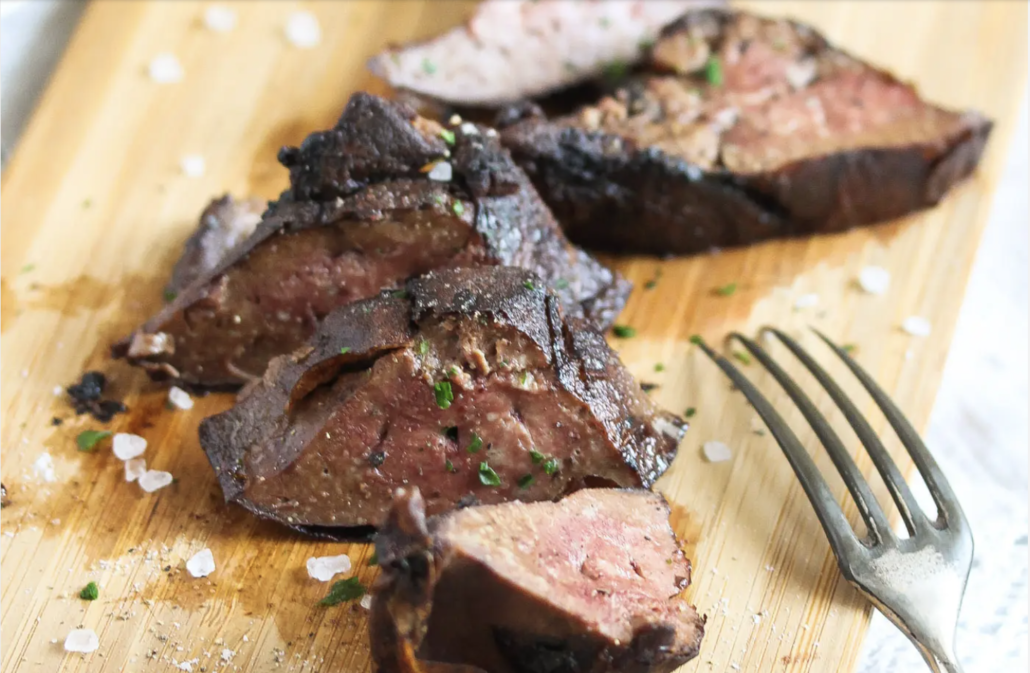We include products in articles we think are useful for our readers. If you buy products or services through links on our website, we may earn a small commission.
Turkey Liver: Superfood Nutrition and Benefits

Turkey liver is one of the most nutrient-dense foods on earth, yet it flies under the radar of most modern eaters.
It’s time to return turkey liver to its rightful place as a worthy addition to our modern diets.
In this article, we’ll explore the nutritional properties that make turkey liver a bonafide superfood. We’ll also look at turkey liver’s health benefits, and offer two recipes that are as easy as they are delicious.
What most people don’t realize is that goose liver is one of the healthiest foods on earth and offers numerous health benefits.
Let’s explore the nutrition and benefits of this under-the-radar superfood.
Table of Contents
Turkey Liver Nutrition
Turkey liver is a nutrient powerhouse. In fact, it’s the food with the highest concentration of vitamin A (retinol) with over 2400% of your RDV per 100 grams.
Turkey liver is also among the highest vitamin B12 foods on earth with 2416% RDV per 100 grams.
These two nutreints alone make turkey liver remarkably healthy without even considering the abundance of various B vitamins, selenium, heme iron, complete proteins, and nourishing animal fat.
About 30% of the fat in turkey liver is anti-inflammatory monounsaturated fat.
Many of these nutrients are only found in meat.
Nutrients Per 100 grams of Turky Liver
| NUTRIENT | AMOUNT | %DV |
| Calories | 273 | 14% |
| Total Fat | 20.5 g | |
| Saturated Fat | 6.9 g | |
| Monounsaturated Fat | 9.1 g | |
| Polyunsaturated Fat | 2.0 g | |
| Protein | 20 g | |
| Carbohydrates | 1.2 g | |
| SIGNIFICANT VITAMINS | ||
| Vitamin A | 21698 mcg | 2410% |
| Vitamin C | 4.5 mg | 8% |
| Riboflavin | 2.8 mg | 162% |
| Niacin | 10.2 mg | 51% |
| Vitamin B6 | 1.0 mg | 52% |
| Folate | 691 mcg | 173% |
| Vitamin B12 | 58 mcg | 2416% |
| Pantothenic Acid | 4.3 mg | 43% |
| Choline | 220 mg | 50% |
| SIGNIFICANT MINERALS | ||
| Iron | 10.7 mg | 59% |
| Magnesium | 17 mg | 4% |
| Phosphorus | 294 mg | 29% |
| Potassium | 211 mg | 6% |
| Zinc | 2.6 mg | 17% |
| Copper | .3 mg | 17% |
| Selenium | 82.5 mch | 118% |
Turkey Liver Nutritional Benefits
The remarkable nutrient abundance in turkey liver means that it can provide numerous health benefits.
Let’s explore these health benefits one nutrient at a time.
Vitamin A (Retinol) in Turkey Liver
Turkey liver is the king of vitamin A foods providing 2410% of your RDV per serving.

In fact, turkey liver is so loaded with this essential fat-soluble nutrient that you can’t eat full servings of turkey liver more than a few times a week. Otherwise, you run the risk of vitamin A toxification.
It’s also important to note that vitamin A in turkey liver is in a form called provitamin A retinol. This type of vitamin A is far more absorbable and useful in the body than the beta-carotene that some plant foods like carrots are famous for.[11]
In fact, high-vitamin A vegetables provide only 1/26 of their listed vitamin A. For example, sweet potatoes are listed as containing 204% of your RDV in vitamin A, but actually only supply 8% of useable vitamin A.
And even then, 45% of people cannot absorb any vitamin A from plants. 5
On the other hand, 75-100 percent of the high-quality vitamin A in goose liver is absorbable but everybody.[7]
So why does this matter? Because vitamin A plays a vital role in numerous important physiological processes, including [12] [13][4]:
- Cellular regeneration of the eyes and skin
- Retinol is a precursor (building block) for important eye pigments like rhodopsin
- thymus gland support–critical to a healthy immune system
- Protects the dopamanergic neurons in the brain, reduces neuroinflammation, and supports circadian rhythms and hormonal balance–all of which protect against neurodegenerative diseases like Parkinson’s and Alzheimer’s
- Supports cardiovascular health
- Supports the inner linings of the body, including the intestines–reduces risk of leaky gut
Vitamin B12 in Turkey Liver
With a whopping 2416% of your RDV of Vitamin B12, turkey liver is one of the best sources of this essential vitamin on earth.
There’s no reason to worry about getting too much B12 since your body stores some of the excess in your liver to be used when needed and expels the rest in urine.
Your body will also store some of it in your own liver for access when needed–even years later!
Vitamin B12 plays an essential role in:
- maintaining a properly functioning nervous system
- the production of DNA and red blood cells
- Maintaining cognitive function
- Supporting psychological health and protecting against depression
Studies have found that high doses of Vitamin B12 like you get from turkey liver offer significant relief from symptoms of depression [7].
When it comes to heart health, studies show that vitamin B12 can decrease homocysteine levels that are significantly associated with heart disease [9][10].
Since B12 is a nutrient found in significant quantities only in animal products, vegans and vegetarians are often deficient. [1] Symptoms of B12 deficiencies include:
- Chronic fatigue [2]
- Psychiatric problems [3]
- Neurological problems [4]
- Increased risks of Alzheimer’s disease [5]
- Intergenerational neurological disorders [6]
Selenium
Turkey liver provides 118% per 100gram serving of this under-the-radar mineral called selenium.
Selenium is crucial to numerous vital bodily processes, including:
- Maintaining thyroid health
- Supporting the immune system
- The creation of proteins called selenoproteins synthesized in your body. Selenoproteins are key to reproductive health and DNA synthesis [19]
- Reducing oxidative stress by combatting free radicals [20]
- Increases levels of the powerful antioxidant called glutathione [21]
- Protection against various cancers: A review of 69 studies with over 350,000 participants found that high blood levels of selenium were associated with a lower risk of lung, breast, colon, and prostate cancers [22]
- Neuroprotective properties–patients with Alzheimer’s disease have low levels of selenium [23][24].
- Supports lung health [25]
Monounsaturated Fat
Turkey liver is one of the fattiest cuts of poultry, with 20 grams per 100-gram serving. This makes it an especially good addition to high-fat, low-carb diets, like carnivore and keto.
Around ⅓ of the fat in turkey liver is monounsaturated fat. This is important because studies have shown that monounsaturated fat is anti-inflammatory and can reduce the risk of heart disease [26][27].
6.9 grams of turkey fat per 100-gram serving is saturated fat, which is not actually dangerous and is, in fact, an essential part of a healthy whole foods diet [28].
The fat in turkey liver makes it an extremely satiating food. Higher satiety reduces cravings and helps people going low-carb overcome carb addictions [29].
Heme Iron
A 100-gram serving of turkey liver provides 59% of your RDV of iron. Like other nutrients in turkey liver, its iron comes in a highly absorbable and useful form called heme iron.
Heme iron is essential to [14]:
- Proper immune function
- Cognitive health
- Converting food into useable energy
Zinc
As a relatively rare mineral, getting 17% of your zinc from a 100-gram serving of turkey liver is significant.
The form of zinc we get from animal foods is 400% more bioavailable than the zinc we get from plant foods.[16].
It’s important to note, however, that when consuming high zinc foods with certain plant foods, the antinutrients in plant foods can block your body’s ability to absorb zinc along with other nutrients.

A key culprit in interfering with zinc absorption is phytic acid found in abundance in grains and legumes.
Getting enough zinc is important for [17][18][19]:
- heart health
- insulin formation, and glycemic control
- Immune function
- Creation of DNA
- Building cells
- Building protein
- Healing damaged tissues
Zinc deficiencies can affect motor development and cognitive development in children.
Low zinc levels in men are associated with erectile dysfunction and lower sperm count in males.
Easy Turkey Liver Recipe
The easiest way to prepare turkey liver is with a simple pan sear.
If you’re practicing a carnivore diet and eliminating all plant foods, these techniques for cooking turkey liver are right up your alley.
Frank Tufano has deservedly earned a reputation as an excellent culinary guide along the carnivore diet journey. In fact, he even started his own online butcher shop where you can purchase high-quality organ meats.
Pan Seared Turkey Liver Recipe

Ingredients
Preparing the Turkey Liver
Since turkey liver isn’t bitter like chicken, beef, or pork liver, you can skip the soaking step. But it is important to clean it correctly.
- Trim off the tough membrane and be sure to carefully remove any green part. This is what will cause any bitter taste.
- Split the turkey liver into two lobes
- Use a paper towel to pat dry
Directions
- Heat butter or tallow in a skillet
- When butter/fat begins to bubble add liver
- Cook until browned on bottom side, flip and cook for 3 more minutes
An ideally cooked liver is creamy on the inside and crisp on the outside.
Be sure not to overcook the liver, which will leave it rubbery and dried out.
Turkey Liver: The Takeaway
Turkey liver is one of the most nutrient-dense foods on earth.
A single serving of turkey liver is like a natural multivitamin.
Turkey liver is extremely high in essential and hard-to-get nutrients like vitamin A (retinol), and various B vitamins, including B12, selenium, iron, and zinc. The form of these vitamins in turkey liver is far more bioavailable than its counterparts in plant foods.
Turkey liver is also high in anti-inflammatory monounsaturated fatty acids.
This complex of highly-absorbable essential nutrients in turkey liver work synergistically in the body to provide extraordinarily potent health benefits, including:
- Supporting heart health
- Boosting immune function
- Supporting cognitive function and protecting the brain against cognitive decline
- Reducing oxidative stress
- Reducing inflammation




















